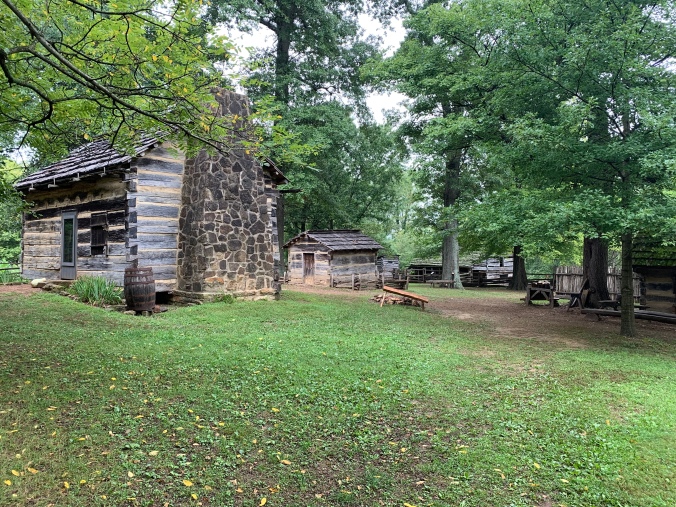When Lincoln’s father left Abe’s birthplace in search of a new home that wouldn’t be stolen, he took the family here, deep into the forest to make their new home from scratch. The park has a living historical farm (above) with crops, chickens and sheep that does a good job of showing life in the early 1800’s, when Abe lived here from age 7 to 21. Much emphasis is placed on the log cabins, to show Lincoln’s humble roots. The visitor center film explains the loss of his closest family members, mostly buried here. There is a trail with stones commemorating Lincoln’s lifetime milestones.
But for me, it is the initial experience that Lincoln had that defines him. His family had literally arrived at the end of the road, being “the poorest people”, and his father must have said, ‘let’s keep going, we’ll make our own road from here’. And they did. Lincoln became a log splitter in boyhood, because the first step at the end of that road was to chop down trees to make a path.
Yes, he was poor and hard-working. But more importantly, Lincoln was a path-making thinker. Unlike formally educated people who are provided answers and common ways of thinking, Lincoln had precious few educational resources available to him, requiring him to be a self-starting, inventive thinker, to use common sense and observation to extrapolate answers to a broad range of questions he had. His mother, who had taught his father how to read, died, and his step mother brought three children with her and about as many books. Faced with a life of endless labor without security that his father had endured and given him, Lincoln viewed knowledge as his pathway into a bigger and broader world.
One of his formative experiences on an early journey was when he got sued for ferrying folks out to catch passing steamboats. The ferry operator said that he was encroaching on their business without a license. Lincoln, arguing his own case in court, said that he wasn’t carrying people all the way across the river, just halfway. And he won.
Another was when he traveled down the Ohio and Mississippi rivers to Natchez, where he saw slaves auctioned. His family was against slavery, but seeing the cruelty up close made a powerful impression on him. He would spend the rest of his life convincing people to abolish slavery.
Where other people in his time may have been educated to believe that slavery was normal and even justifiable, Lincoln was used to forming his own thoughts. Arguing against those who thought slavery normal, he noted that none of them are willing to volunteer for it themselves. He argued to those who believe that slavery is justified by skin shade, intellect or self-interest, that they should logically become the slaves of anyone lighter in color, smarter or greedier than they are. His arguments persuaded people.
The times were leading to an inevitable bloody conflict to choose slavery or Democracy, and Lincoln would be the one to find the path forward.

Pingback: Lincoln Home National Historic Site | Zero Carbon Travel
Pingback: Road to Abolition | Zero Carbon Travel
Pingback: The Road to Equal Education | Zero Carbon Travel